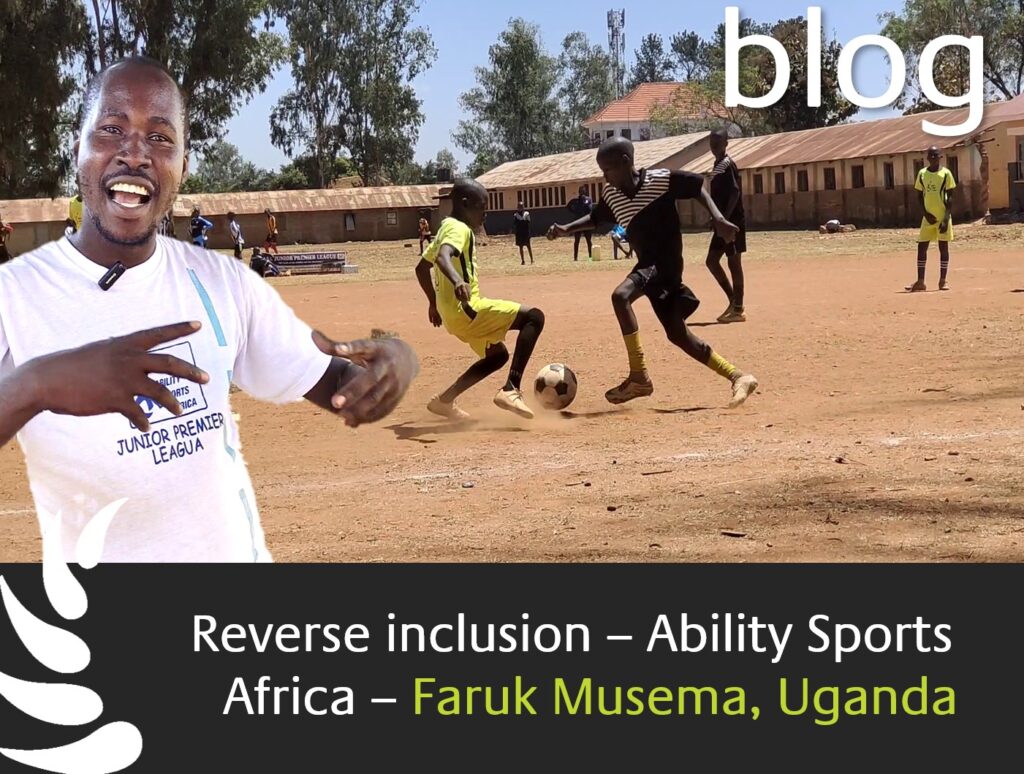Summary
"... And the crowd goes wild!" - reverse inclusion in Gulu, Uganda
The following blog post is another that documents Riya and Chacko's tour through Africa.
Here, two kanthari alumni meet. Samuel Odwar, the founder of Thumbs Up Academy, an inclusive school for children with and without disabilities meets up with Faruk Musema, a non-disabled disability activist who seeks to promote acceptance of disabled people through his concept of "Reversed Inclusion" using sports as a vehicle.
By Riya Orison und Chacko Jacob
We are in Gulu, Northern Uganda. The anticipation on a Friday night among the disabled and non-disabled students of Thumbs Up Academy for the next day is palpable. Faruk comes along with a dedicated coach every Saturday to Thumbs Up Academy to play a bunch of adaptive sports and games. The children look forward to the day eagerly; they especially love Boccia. One of the classrooms/halls has been marked with boundaries and lines to facilitate this. First, everyone warms up outside on the grassy playground. Coach Paul arranges everyone in four lines and then instructs everyone to move 20 metres forward and back to the end of the line turn by turn. The catch is that each child must move a specific way, some hop, some crawl, some use their wheelchair, and some simply roll on the ground. And then comes a lesson at the end: everyone has the capability to accomplish any task, but in their own unique way, and there is no need to judge that.
When it comes to Boccia, it’s serious business. The spectators enter the hall first and start cheering as the four two-person teams enter one by one, parading themselves and strutting about proudly to the crowd and getting them amped up. The games are always too close to call, there is always a last-moment winner, and the crowd goes wild every time their favourite team scores! And in the end, everyone is a winner.

Faruk’s Ability Sports Africa (aka ASA) is easily one of the most fun projects that one could visit or be part of. Social change through sports… what’s not to like about that?? Watching children with and without disabilities of all kinds engaging in different sports without any barriers or prejudices between each other is a joy unlike any other.
It’s not just the children that are growing up to think and act inclusively; ASA also influences the larger sports community with 40 coaches having been trained in various adaptive games and sports. The coaches we spoke to have an air of pride in working with children with disabilities, believing it to be a great advantage in advancing their own professional skills as well.
ASA also supports around 20 mothers of disabled children with income-generating activities, so that the kids can be happy both on and off the field.
A crown jewel of ASA is the ASA Junior Premier League, a football academy that boasts 180 deaf, hearing impaired, and hearing boys and girls. Out there on the football pitch, the local spectators cheer for anyone showing great skill. It doesn’t matter if they are disabled, non-disabled, or belong to any particular gender. It is even hard to distinguish such things most of the time. While we were there the matches were taking place in a school ground, but now they have gotten a space at Gulu’s largest stadium.
The matches attract a local crowd that becomes slowly aware that disability does not mean non-participation in sports and society in general. This way, parents of children with disabilities are also encouraged to send their children to participate. To date, he has touched the lives of 560 children with disabilities both in schools and the community at large.
The beautiful thing about ASA’s projects is that most of them are community-based – meaning they are taken care of financially and otherwise by the community benefiting from the project. This brings in even more ownership among the beneficiaries and long-lasting change, as nobody is eager to lose this good thing they have going for them, and when others see such passion, they are also converted to an inclusive way of thinking.
Some of Faruk’s partners have been pushing him to register as a national organization, encouraging him to not let all the goodness remain just in Gulu. And they are right. We wish Faruk all the best with his bigger vision of spreading out across East Africa and promoting reverse inclusion.
More about Faruk’s work can be found at: https://abilitysportsafrica.org/



